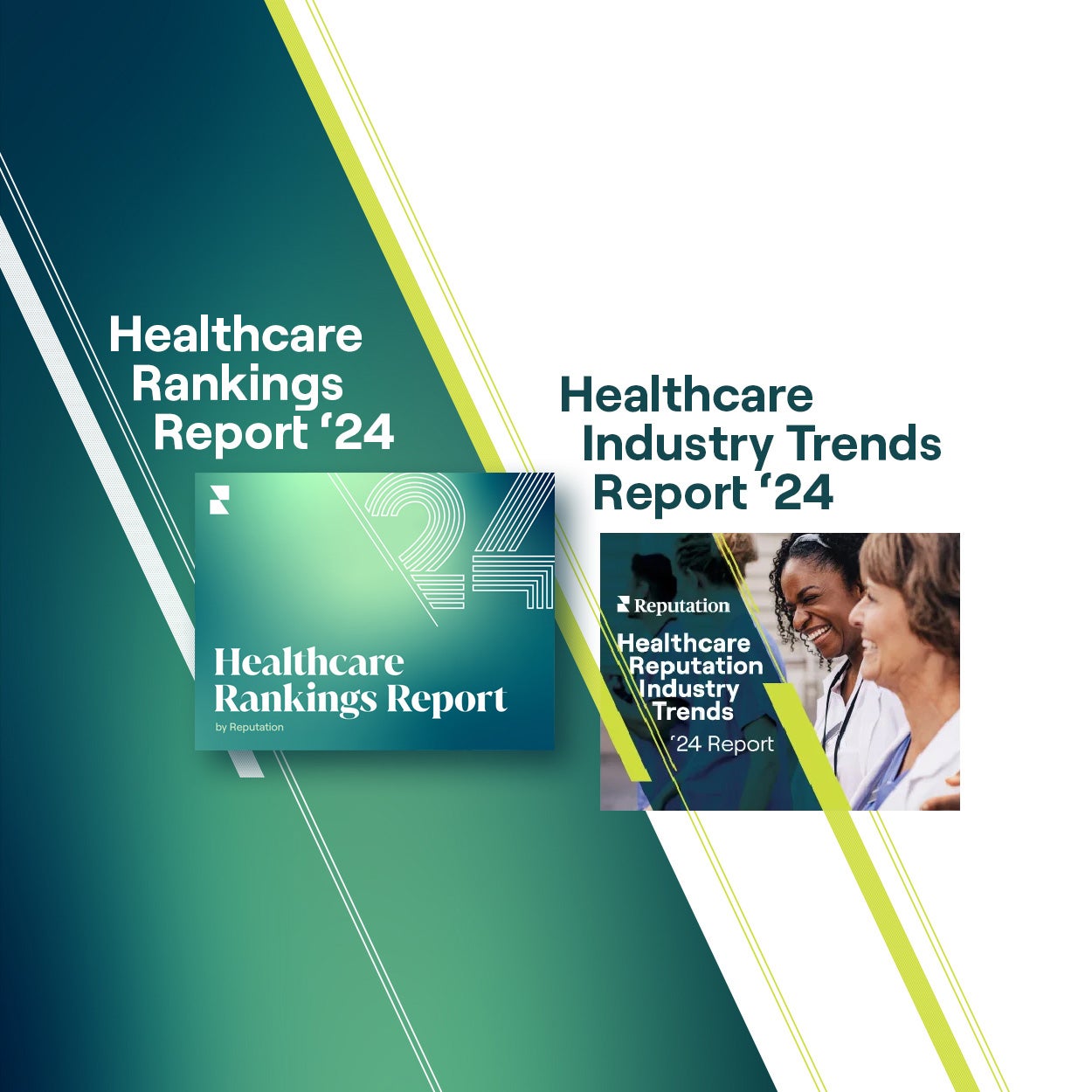Top Trends for Online Reputation Management in 2018
Reputation Staff Writer

How to Gain Competitive Advantage in the Year Ahead
Introduction
The past year ushered in some big changes for online reputation management (ORM) — and the practice has become indispensable for any location-based enterprise.
In 2017, review sources proliferated, consumers became more savvy about the validity of online reviews, and the position of Chief Experience Officer started to gain traction among location-based organizations. ORM and SEO became increasingly intertwined as Google refined its search algorithms with a strong emphasis on reviews and star ratings.
This year, expect to see these four trends move to the forefront:
- Google will extend its dominance in online review volume and consumer exposure, eclipsing all other specialty sites.
- SEO will be reinvented as user-generated reviews weigh more heavily in search rankings.
- The voice of the customer will become increasingly unified across previously disconnected categories.
- Consumer feedback from reviews and social media will drive operational improvements.
1. Google will extend its dominance in online review volume and consumer exposure, eclipsing all other specialty sites
Google reviews are the gateway to local business.
According to the latest metrics reported, Google processes more than 3.5 billion queries every day — 1.2 trillion per year — worldwide.
But Google offers more than search results. The site is quickly becoming a one-stop shop for online reviews, ratings, directions, hours and more — all the information a consumer would need to make a decision about where to go for products and services. The implication? If your locations’ listings aren’t up to date on Google, you’re losing business.
Google is so far ahead, the “long tail” of periphery listing directories may not matter. SearchEngineWatch found major sites — Google, Facebook and Bing — receive 90 percent of consumer traffic, with all other specialty sites accounting for a combined 10 percent. These sites are certainly important for highly-focused segments, to be sure, but not where the volume is headed.
Analysts predict the trend toward using Google will continue, and having a strong presence there will be essential for success. Failing to correct and maintain your business listings can result in less visibility and lower search rankings for your locations. If people can’t find you on search, they’ll find your competitors, and you’ll lose business.
Google, Facebook and Bing receive 90 percent of consumer traffic, whereas the smaller specialty sites only get 10 percent.
Your Competitive Advantage: Focus on Sites that Matter Most — Starting with Google

Employ ORM strategies to ensure your business listings are in the best-possible shape, and that they’re complete, accurate and consistent across the web.
- Have a single source of truth: Unify your data from listings, reviews, reporting and more into a single repository.
- Audit, claim and complete your listings: Enlist the help of an ORM provider to audit and claim your listings and provide ongoing management to ensure accuracy and consistency.
- Request reviews: A steady stream of recent online reviews helps to boost rankings in near-me search, so you outrank competitors and capture more local business.
2. SEO will be reinvented as user-generated reviews weigh more heavily in search rankings
Say so-long to the days of keyword stuffing.
Traditional SEO practices are no longer adequate to improve rankings and attract traffic. In fact, Google’s algorithms punish businesses that overuse keywords in site content.
Getting into Google’s local 3-pack — the three listings that appear at the top of search results and as red dots on the map — depends on the quality of your online reputation, not the quantity of keywords on your website. Business listings must be accurate to avoid being penalized by Google’s algorithms, and you must have a high volume of high-quality positive reviews.
And remember, if you do rank among the top three, snippets of your reviews will be included in results — for all to read.
Your Competitive Advantage: Rank High and Shine Online
- Build Review Volume: The more reviews you have, the higher your overall star ratings will be. And, reviews provide insight into customer experience that you can use to improve the customer experience and create more happy, loyal — and vocal — customers.
- Focus on Google: Make sure a substantial number of your online reviews are submitted on Google. ORM platforms can help ensure your reviews are evenly distributed across major review sites.
- Stream Reviews to Your Locations Pages: User-generated content in the form of rich, recent detailed reviews, is crawlable by search engines and helps your locations rank higher. It also provides essential information to consumers as they decide what businesses to patronize.
3. The Voice of the Customer will become increasingly unified across previously disconnected categories
Given the first two trends, it’s clear companies should no longer treat review management, social media and customer surveys as isolated islands of data.
All of these resources provide essential customer experience information that help businesses refine operations, inform staff training and make targeted improvements that lead to ongoing customer satisfaction — collectively contributing to better star ratings and search rankings.
In 2018 and beyond, leading companies will look for ways to bring coherence to these formerly disconnected sources of insight about customer experience. Structured data (in surveys and star ratings) and unstructured data (in social posts and the text in reviews) will be analyzed together, to provide a more complete picture of a brand’s online reputation.
And this brings us to the final trend…
4. Consumer feedback from reviews and social media will drive operational improvements
Insights will lead to a better customer experience.
While higher rankings are still an important benefit of ORM, companies are realizing that feedback from online reviews, social media and surveys can be used to make targeted operational improvements that have a direct impact on customer experience (CX).
In fact, Gartner predicts that in 2018, more than 50 percent of organizations will be shifting more focus — and spend — toward innovations that improve customer experience.
Your Competitive Advantage: Create a Virtuous Cycle of Customer Engagement
Using the following ORM tactics and strategies, organizations can create a virtuous cycle of continuous customer experience improvement.
- Gather input via reviews, surveys and social media: The first step is to collect candid feedback. Look for an ORM solution that simplifies the process of collecting and responding to online reviews, engaging with your audience on social channels and conducting effective customer satisfaction surveys. For best results, reach out to customers where they are, in the formats and channels they prefer.
- Gain actionable insights: Thematic and sentiment analysis tools enable companies to zero in on feedback from various sources to pinpoint problem areas and standardize on what works across organizations. Word charts help to identify strengths and weaknesses in customer experience at individual locations and across an organization as a whole. Using machine learning, some tools apply sentiment analysis to glean actionable insights from free text in reviews and social media comments.
- Know where you stand: Competitive benchmarking is essential to understanding and exceeding customer expectations. ORM platforms can provide a visualization of performance trends relative to industry benchmarks — at a glance.
- Share your findings: ORM solutions provide reporting templates that can be customized to present data according to the needs of different groups within an organization — keeping everyone informed of the trends and feedback you uncover in surveys and reviews.
An influx of positive reviews will result in better ratings and additional actionable feedback, creating a stronger connection with your growing base of loyal customers and advocates.
Don’t Get Left Behind
If you haven’t already, establish sound ORM strategies now.
Look for integrated solutions that tie together all facets of reputation management, providing a 360-degree view of how your organization is perceived by customers and how you can improve service quality.
Check out the Recommended Resources section below for more information on getting started with ORM.

